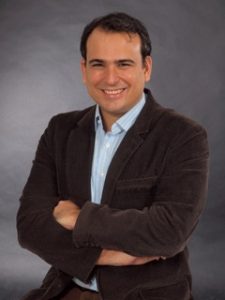Speaker: Dr. Felipe de Barros
Affiliation: USC

Dr. Felipe de Barros, Assistant Professor in the Department of Civil and Environmental Engineering at USC, presents: “Groundwater-driven Probabilistic Risk Assessment“.
Summary:
Reliable quantification of human health risk from toxic chemicals present in the subsurface environment is not a trivial task. The main difficulty relies on the fact that many of the components that constitute human health risk assessment due to contaminated groundwater are uncertain and requires interdisciplinary knowledge. For example, the lack of a detailed characterization of the subsurface’s hydrogeological properties leads to uncertainty in concentration predictions at environmentally sensitive locations. On the other hand, additional uncertainty stems from the behavioral and physiological characteristics of the exposed population. As a consequence, the end-point risk prediction, e.g. adverse human health, is subject to uncertainty. Understanding the impact from each of these components (i.e. hydrological and public health) in risk estimation can provide guidance for decision makers to manage contaminated sites and best allocate resources towards minimal prediction uncertainty. This presentation will focus on the impact of aquifer heterogeneity in the probabilistic characterization of the transport predictions relevant to risk quantification. Spatial heterogeneity of the hydrogeological properties can lead to the formation of preferential ow channels which control the solute plume spreading rates and travel time statistics, both which are critical in assessing the risk level. By making use of an integrated stochastic risk framework, we highlight the significance of natural heterogeneity and engineering factors in both controlling the magnitude and uncertainty of environmental performance metrics utilized for quantifying risk. Through a series of analytical and numerical examples, we show how fundamental knowledge on the main physical mechanisms affecting solute pathways are necessary to understand the risk response to varying drivers.
Biography:
Dr. Felipe de Barros is an Assistant Professor in the Department of Civil and Environmental Engineering at the University of Southern California (USC). He joined USC in January 2013. Dr. de Barros’ main expertise is in stochastic groundwater hydrology and environmental fluid mechanics. His research interests include flow and transport in heterogeneous porous media, stochastic hydrogeology and human health risk.
One of his main research lines consists of combining geological site characterization with human health risk models. Dr. de Barros has earned his PhD in the Department of Civil and Environmental Engineering at the University of California, Berkeley. He also holds an Eng. Degree and MSc in Mechanical Engineering from the Federal University of Rio de Janeiro (Brazil). After the completion of the PhD at UC Berkeley, Dr. Felipe de Barros worked as a post-doctorate research fellow at the University of Stuttgart (Germany) and the Polytechnic University of Catalonia (Spain).
Dr. de Barros has published over 45 papers in peer-reviewed journals and is an active member of the American Geophysical Union and the European Geosciences Union. He is the recent recipient of the NSF CAREER award and the 2016 Editor’s Citation for Excellence in Refereeing for Water Resources Research. He has served as a reviewer for the top journals in field of water resources and is currently an Associated Editor for the Journal of Hydrology and the Hydrological Sciences Journal.
Date/Time:
Date(s) - May 18, 2017
11:00 am - 12:00 pm
Location:
Boelter Hall 4275
4275 Boelter Hall Los Angeles CA 90095
